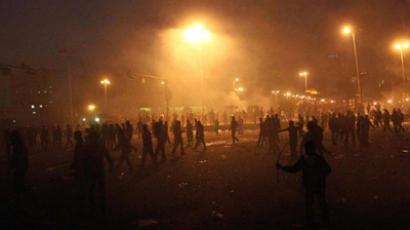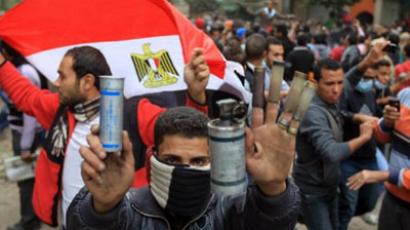Protesters block government headquarters in Cairo
Demonstrators in the Egyptian capital have blockaded a government building close to Tahrir Square where they are rallying against the new army-appointed prime minister.
Kamal el-Ganzouri, who was appointed Egypt’s head of government by the army on Friday, has reportedly been given more powers than his predecessor.He has promised not to form a government until the results of Monday's elections are announced. But infuriated protesters have called his appointment illegitimate because el-Ganzouri held the same position in the late 1990s under ousted President Hosni Mubarak.The new PM insists he will not work with Field Marshal Hussein Tantawi who has pledged not to remain in power, but protesters are reluctant to believe him. Egypt’s military has failed to lift much-hated emergency laws and transfer legislative powers, so Egyptians naturally feel nothing has really changed since Mubarak's exit.“People are back out on the streets, occupying Tahrir Square to say things have to change,” Ann Wright, an anti-war activist and retired US army colonel who is in Cairo at the moment and has spent the whole day on Tahrir Square.“They represent a huge amount of the Egyptian populace,” she says. “Overwhelming support for change is there.”Ann Wright says the excessive use of police force on civilian protesters over the last week, and in particular the heavy-handed use of military-grade tear gas, make it clear the regime is still not listening to the people's concerns. Now the protesters have laid responsibilty for civilian deaths squarely at the door of the ruling military council.Despite this, Ann Wright says, people she spoke to on the Square do not want violence and are simply waiting for elections so that they can use their votes to change the situation in the country peacefully.
Middle East experts have welcomed the continued protests on Tahrir Square as a good omen for Egypt's future. Sara Marusek of Syracuse University says is a sign that the Egyptian people are intent on completing the revolutionary process they began early this year which led to the ousting of President Mubarak, but left them with an unelected military government. “It is clear that [Egyptian] military is tempted to preserve as much undemocratic power as possible. Egyptians basically go to the streets saying ‘No, this is not OK.’ This is really an ongoing revolution which is really nice to see Egyptians fighting for.”Marusek predicts that the former regime’s main opponent – the Muslim Brotherhood – will be very cautious and pragmatic in dealing with the military junta in power, focussing its energies instead on the forthcoming elections.
The scenario which ended with the ousting of President Hosni Mubarak in February seems to be repeating itself now as the country's military rulers seem far from comprehending the situation on the ground, argues Hoda Osman, the president of the US-based Arab and Middle Eastern Journalists Association.“The members of the [military] council appeared on TV at a press conference on Friday justifying their actions. It does not seem that they are willing to actually hand over power.”The determination and spirit of protesters that led to President Mubarak stepping down is still strong and they believe they can repeat that success with the new military rulers, Osman says.“Protesters definitely do not trust the military,” insists Osman, because it is showing no sign of relinquishing control over the levers of power, and is merely moving to install a puppet government which would continue to do its bidding. The analyst believes that the protesters have a clearer vision now than they did when they toppled Mubarak. With a consensus emerging that what is needed is a handover of power to a civilian government, all eyes are now on Monday’s elections.














